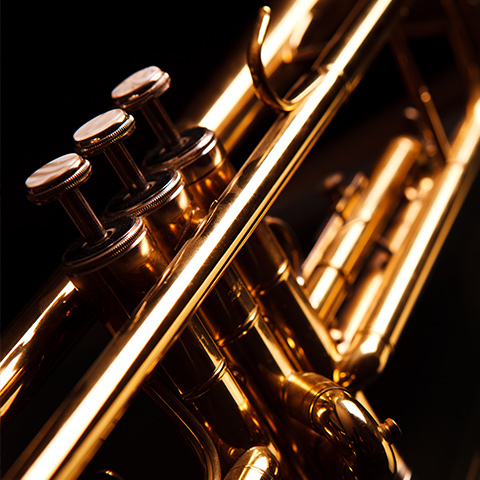EMMA LOU DIEMER: Declamation (1967)
Emma Lou Diemer was born in Kansas City, Missouri on November 24, 1927. She started playing the piano and composing at a young age. Diemer wrote her first piano work at age 7, and she became the organist at her church by age 13. Diemer went on to major in composition at the Yale School of Music and the Eastman School of Music. She has written many works for orchestra, chamber ensembles, keyboard, and voice. Diemer is currently an active keyboardist and educator.
ORLANDO DE LASSUS (arr. Robert King): Providebam Dominum (1560)
Orlando De Lassus was one of the most influential musicians of the late 16th century. De Lassus wrote over 2,000 works, including Italian madrigals, German lieder, French chansons, and Latin motets. Providebam Dominum (I Look Forward to the Lord) is a sacred motet for seven voices in two choirs. In this edition by Robert King, three trumpets play the soprano parts of the first choir, and a small brass choir plays the parts of the second choir.
PAUL HINDEMITH: Apparebit repentina dies (1947)
Hindemith was born on November 16, 1895 in Hanau, Germany. He is respected as one of the most distinguished viola players of his time. Hindemith devoted the earlier part of his career to performance. He was also prolific in composition and wrote music in a variety of forms. Apparebit repentina dies is set in four movements. The first warns of the consequences of the day of judgment. The second frames a dialogue in which Christ separates the righteous from the unrighteous. The beginning of the third movement tells of the unjust being swept back into hellfire and the baying of Cerberus at hell's gates, depicted by the four French horns. At the end of this movement, Hindemith employs one of his most memorable melodies, which radiates from the brass through the chorus, leading ultimately to a jubilant conclusion. The brief fourth movement owes its form to the chorale so favored by J.S. Bach. With this ingenious harmonized finale, Hindemith pays homage to his past.
KEVIN KASKA: Hymn of Praise (1999)
Hymn of Praise was written for organist Gregory Peterson, who was organist and director of music at Old South Church from 1997-2005. It was first performed on a CD project, Heroic Sounds, which was a collaboration between Gregory Peterson and the Old South Brass, with Lawrence Isaacson conducting. Peterson said of this piece, “Kevin Kaska provides beautiful lyric writing for brass with organ counterpoint in the form of a ritornello. I am very pleased with the piece.”
MARCEL DUPRE (ed. H. W. Grey): Poem Heroique (1937)
Marcel Dupré was the organist of Notre Dame from 1916 to 1922 and went on to become the organ professor at the Paris Conservatory in 1926. Poeme Heroique opens with trumpet calls and a dotted marching rhythm, depicting the procession of soldiers to the front lines. This portrait of war is interrupted by a reverent central section, which may represent prayers for the fallen soldiers or prayers from the soldiers themselves. The march returns and then leads into a conclusion depicting the conflict. The prayerful theme returns again, now turned into a hymn of triumph and thanks.
OTTORINO RESPIGHI (arr. John Eric Noran): The Pines of the Appian Way (1924)
Ottorino Resphigi was born in Bologna, Italy in 1879. In 1913, he settled down in Rome and was appointed professor at the Conservatory of St. Cecelia. Respighi was considered a great observer, and this can be seen in the sensory nature of his most successful works. The Pines of Rome is a symphonic poem depicting four forested landscapes near Rome. In the fourth movement, he paints a picture of Roman legions heading back from battle along the Appian Way.
—Maya Schiek, M.M. '24

